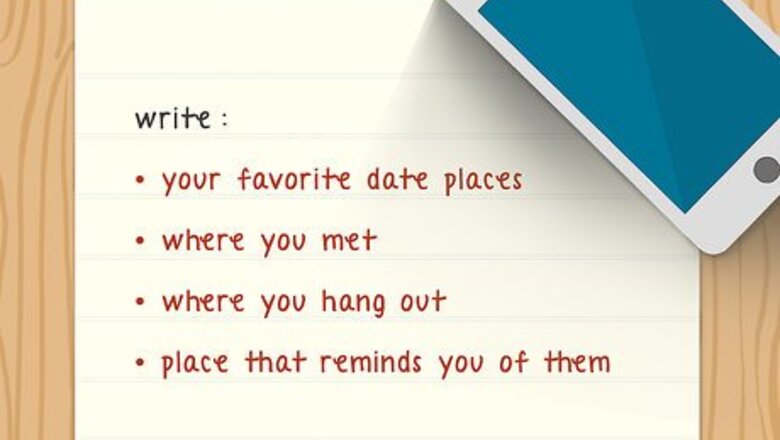
views
Inspiration
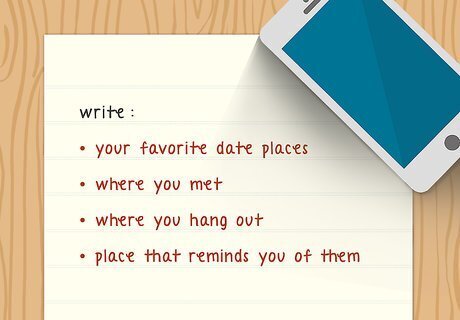
Write somewhere that reminds you of them. If you live together or have a favorite place to hang out at one of your houses, try writing there. The surroundings will remind you of them and can help get your creativity going. You can also write in your favorite date places, where you met, or anywhere else that reminds you of them.

Focus on a story, not an emotion. A song that's just about how much you love someone will leave your listener wondering why. Think of a story about your boyfriend or girlfriend that explains how you feel about them. Write down all the ideas you can think of and pick the one you like best. It could be about how you met, the moment you realized you fell in love, or your favorite memory of them. It's okay to include how you felt in the story you're telling, but don't make your emotions the focus.

Trust your instincts. If you're writing a series of ideas down, and one makes you feel extra emotional, or you just feel good about it, trust it! If you like it and respond to it, chances are your boyfriend or girlfriend will, too. For example, pay to attention to how you feel as you write your list of ideas. When you write down "the day we met" or "our first fight," do you start to remember that event in a lot of detail? If you do, and it makes you feel more emotional than other things on your list, go with that idea! Taylor Swift Taylor Swift, Singer & Businesswoman Music can help create beautiful memories. "I've always felt music is the only way to give an instantaneous moment the feel of slow motion. To romanticize it and glorify it and give it a soundtrack and a rhythm."
Lyrics
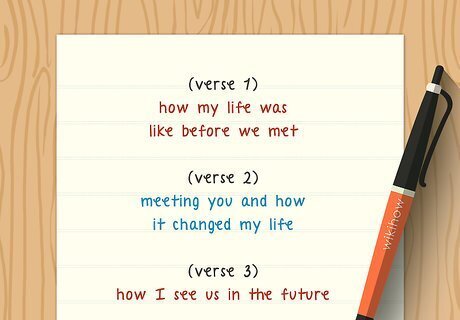
Divide your lyrics into 3 acts. Once you've decided what story you want to tell, divide it into 3 parts, with the third part acting as the climax of your song. It will keep your boyfriend or girlfriend interested, and shows them just how much you've paid attention to your relationship! For example, you could write your first verse about what your life was like before you met. Your second verse could focus on meeting your boyfriend or girlfriend and how it changed your life. Your third verse (or the bridge) can be about what you see for the 2 of you in the future.
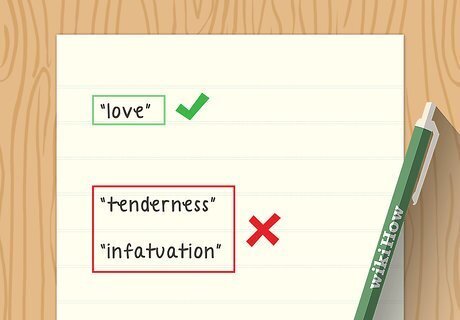
Use common words in your lyrics. When you first begin writing your lyrics, don't worry about rhyming or sounding poetic. Use the first words that occur to you, which will likely be common, everyday words. Your lyrics will sound more relatable and honest. For example, using the word "love" instead of "tenderness" or "infatuation" sounds better and more honest.
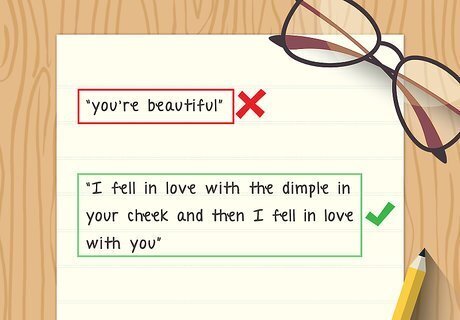
Be specific in your lyrics. The more specific your lyrics are, the more personal the song will feel. You can say something like "you're beautiful," but that could apply to a lot of people. Instead, say something specific like, "I fell in love with the dimple in your cheek and then I fell in love with you."
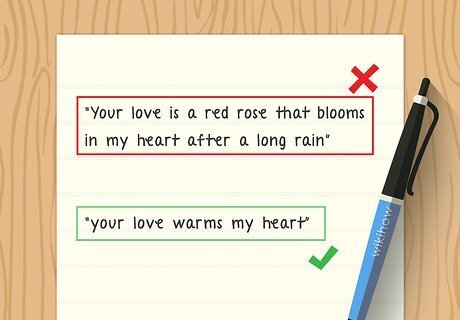
Try not to use metaphors. You might be tempted to make up a metaphor to describe how you feel about your boyfriend or girlfriend. It can feel like a new way to say something you've said a lot before. Try to avoid using them, though. You don't want your boyfriend or girlfriend to spend so much time figuring out what you're trying to say that they never figure out how you're feeling. For example, instead of saying "Your love is a red rose that blooms in my heart after a long rain," you can say "your love warms my heart."
Melody
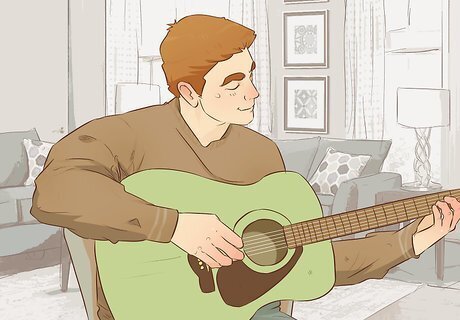
Use an acoustic instrument. Most classic love songs use mainly acoustic instruments. When you're writing your melody, stick with acoustic instruments. Piano and acoustic guitar are the most popular for writing love songs.
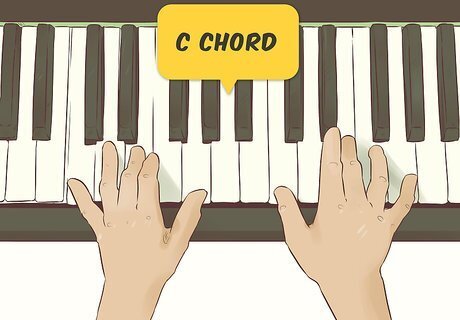
Choose a major key. Most love songs are written in major keys. They sound more romantic and uplifting. The exact key you choose will depend on your vocal range, but as long as you stick with a major key, you've got a good place to start. G, C, D, and A major are the most common major keys. If you're not exactly sure which key you should use, start with G major. Most voices sound good in G major. If you're not sure what key to write in, think about what key sounds good with your range and with the melody. You can also reference songs you like and you know you can sing well, and use that key. You can also raise and lower the key by a half-step to make it more comfortable to sing, if you need to.
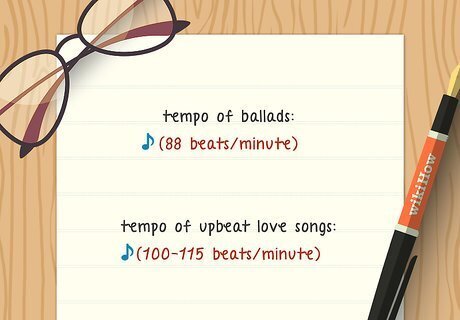
Match your tempo to your lyrics. If your lyrics are very tender or describe a particularly romantic moment with your boyfriend or girlfriend, you'll want to match them to a slower tempo. If your lyrics are about fun you've had with your boyfriend or girlfriend or something more upbeat, choose a quicker tempo. You can find metronomes online, which you can adjust to the tempo you want to use. They'll help you write your song in rhythm. Most ballads have a tempo of about 88 beats per minute. More upbeat love songs have a tempo of around 100-115 beats per minute.

Write most of the melody for your middle range. You don't want to write a song for your boyfriend or girlfriend, only to find out you can't sing it! Write most of the melody so that it falls in the middle of your range. Those exact notes will depend on what type of voice you have, but you shouldn't ever feel like you're straining your vocal chords while you're singing your melody.

Use higher notes for the emotional climax of the song. An upward lift, or a jump to higher notes, is a great choice for the climax of a love song. It mimics the way a person's heart leaps when they see or talk about the person they love. Make sure the key of the song is low enough that any high notes will sound clear and unstrained. You can add this leap in the final chorus of your song or in the last verse. How much of a leap you write depends on your vocal abilities. Don't leap too far and end up with notes you can't sing. You might have to try out a few different leaps before you get it exactly right.



















Comments
0 comment